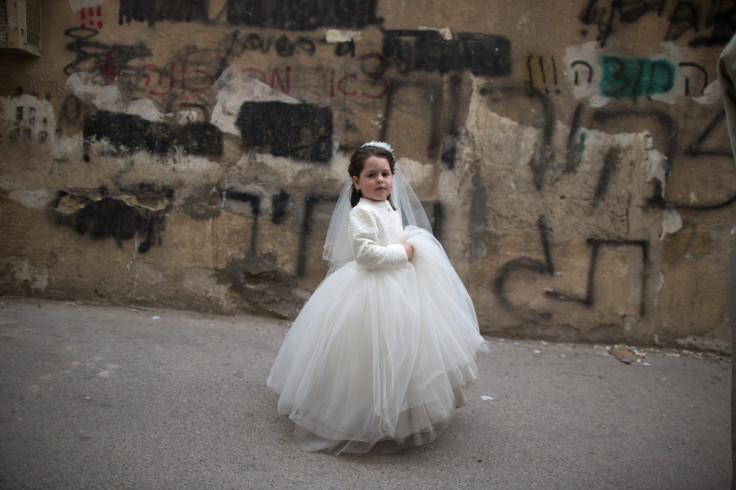Israeli Purim Ads Blurred Girls' Faces, Campaign Pushes Back In Latest Front Of Ongoing Battle

Every year, in the Israeli city of Beit Shemesh, advertisements for children's costumes for the Jewish festival of Purim blur out the faces of girls but leave boys' faces intact. This year, some residents of the city are putting up a fight against what they call "madness," launching a campaign in newspapers and on Facebook, in English and Hebrew, to raise awareness about the ads and to push for an end to the removal of women from public spheres.
Purim, the Jewish holiday that commemorates Esther, the savior of the Jewish people in the Persian empire, begins at sunset on March 4 and ends the following day.
"Mommy, why did they erase the little girl's face?" asks a small girl, sitting across a table from her mother, in a photo in the campaign's primary ad. "What message are we sending our boys and girls?" reads a question below the image, according to the Israeli newspaper Haaretz.
"Our plea is to 'bring back the sanity,'" Miriam Zussman, a member of the group conducting the campaign, told Haaretz. "The mainstream national-religious community has been slowly and insidiously accepting haredi [ultra-Orthodox Jewish] norms on the erasure of women from public sphere [sic] including newspapers, phone books and newsletters," she said.
For advertisers, the fear is that if they don't remove female faces, they could lose revenue from the conservative, ultra-Orthodox Jewish community from which the push for bans originated, according to Haaretz. Some newspapers that publish the ads have a wide audience that includes both moderate and ultra-Orthodox Jews, who have different views on what these ads should include.
In early February, an ultra-Orthodox Jewish group demanded strict limitations on ads in newspapers in Beit Shemesh, calling for advertisers not to publish ads that showed photos or silhouettes of girls, hair and even women's shoes, Haaretz reported. The group, the Committee for the Purity of the Camp, also sought to ban images of beds and women's clothing, along with words such as pregnancy.
But this is not the first time this same controversy has stirred Beit Shemesh residents. One woman protested last year when a local paper ran an advertisement with blurred faces and convinced the paper, for the time being, to leave girls' faces as is. In 2012, an Orthodox Jewish woman protested the same blurring of girls' faces in costume ads by taking to Facebook, eventually forcing the company selling the costumes in the ads to apologize, the Jewish Daily Forward reported. This year's campaign seems to be just the latest episode in a series of pushbacks.
© Copyright IBTimes 2024. All rights reserved.






















